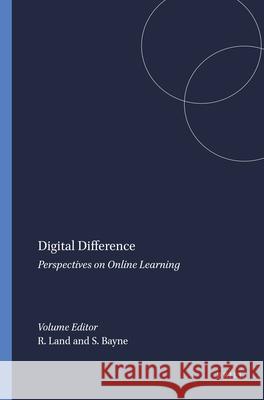Digital Difference : Perspectives on Online Learning » książka
Digital Difference : Perspectives on Online Learning
ISBN-13: 9789460915796 / Angielski / Twarda / 2011 / 200 str.
Digital Difference : Perspectives on Online Learning
ISBN-13: 9789460915796 / Angielski / Twarda / 2011 / 200 str.
(netto: 420,89 VAT: 5%)
Najniższa cena z 30 dni: 425,63
ok. 22 dni roboczych.
Darmowa dostawa!
A sense of disquietude seems ever present when discussing new digital practices. The transformations incurred through these can be profound, troublesome in nature and far-reaching. Moral panics remain readily available. Discussing the manner in which digital culture within education might differ from its 'analogue' predecessors incurs the risk of resorting to increasingly roadworn meta-phors of new frontiers, 'cyber' domains, inter-generational conflicts and, inevitably, the futurist utopias and dystopias characterised by Western media throughout the twentieth century. These imaginings now seem to belong to an earlier era of internet thinking. We are freer, over two decades on, to re-evaluate digital difference from new perspectives. Are digital learning environments now orthodox, or do the rapidly emerging technologies hold a new promise and a new arena of difference for pedagogical practice? What are the points of rift, and the points of continuity, between virtual learning spaces and their equivalents in the real? What qualities of difference should concern us now? The writings in this collection from three continents reflect a complex embrace of culture, power and technology. Topics range from social questions of consumption, speed, uncertainty, and risk to individual issues of identity, selfhood and desire. Ethical issues arise, involving equity and authority, as well as structural questions of order and ambiguity. From these themes emerges an engaging agenda for future educational research and practice in higher education over the coming decade. The book will interest teachers, practitioners and managers from all disciplines, as well as educational researchers."
A sense of disquietude seems ever present when discussing new digital practices. The transformations incurred through these can be profound, troublesome in nature and far-reaching. Moral panics remain readily available. Discussing the manner in which digital culture within education might differ from its analogue predecessors incurs the risk of resorting to increasingly roadworn meta¬phors of new frontiers, cyber domains, inter-generational conflicts and, inevitably, the futurist utopias and dystopias characterised by Western media throughout the twentieth century. These imaginings now seem to belong to an earlier era of internet thinking. We are freer, over two decades on, to re-evaluate digital difference from new perspectives. Are digital learning environments now orthodox, or do the rapidly emerging technologies hold a new promise and a new arena of difference for pedagogical practice? What are the points of rift, and the points of continuity, between virtual learning spaces and their equivalents in the real? What qualities of difference should concern us now?The writings in this collection from three continents reflect a complex embrace of culture, power and technology. Topics range from social questions of consumption, speed, uncertainty, and risk to individual issues of identity, selfhood and desire. Ethical issues arise, involving equity and authority, as well as structural questions of order and ambiguity. From these themes emerges an engaging agenda for future educational research and practice in higher education over the coming decade. The book will interest teachers, practitioners and managers from all disciplines, as well as educational researchers.











